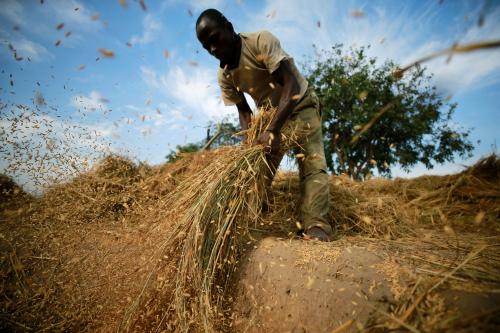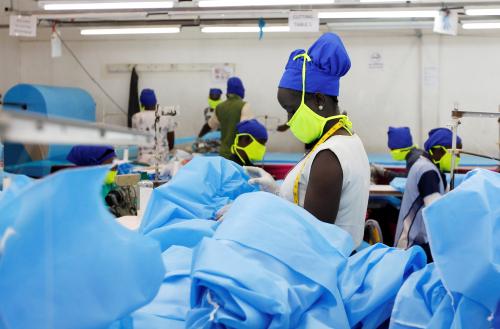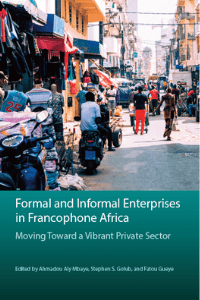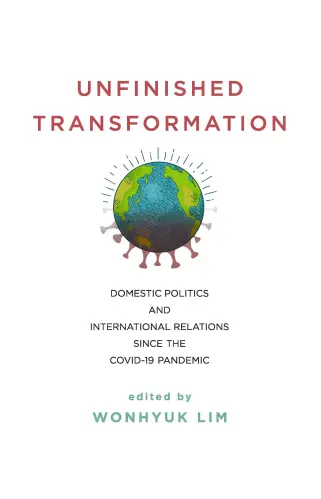The global spread of COVID-19 and the rising number of confirmed cases in Africa have raised concerns about the weak health care systems in the region, while the lockdowns have caused economies to contract substantially. Receiving less public attention, and yet also putting at risk lives and livelihoods, is the likelihood that COVID-19 and the associated economic challenges will spill into an African food crisis if the food system cannot cope. Half of Africans already face food insecurity, of which 50 percent are severely food insecure, while the number of people who are hungry is likely to double in 2020.
The continent is already grappling with food security challenges. Locust swarms in the Horn of Africa, regional insecurity and conflict, climate-change-related droughts and flooding are destroying crops and the livelihoods of millions of African smallholder farmers. Furthermore, the COVID-19 pandemic potentially undermines the capacity of both short-term production and distribution. The challenge for Africa, during and after the coronavirus crisis, is to identify and rally around priority areas in order to accelerate a more rapid transformation of the food system.
Food prices rise as supply chains languish
Africa is a huge net food importer, at a cost of more than $47 billion in 2018. The recent devaluation of several African currencies, combined with declining commodity prices, has put further stress on African countries’ capacity to ensure food and nutrition security.
Several countries saw food prices spike initially due to panic buying, transport restrictions, and rising prices of food imports. In Zimbabwe, South Sudan, and Sudan, prices continue to increase substantially—driven by overall tight food supplies, and disruptions to trade flows and market function related to COVID-19. COVID-19-related transport restrictions make it particularly difficult for suppliers to get such inputs as seeds, fertilizers, crop protection products, equipment, and animal feed to rural farmers in time for planting season, disrupting production of staples such as rice, maize, and vegetables. Restrictions are also triggering additional higher post-harvest losses, as unsold and rotting food accumulates on farms.
Food-related businesses—and their employees—take a hit
Demand from Asian, European, and U.S. markets for agricultural exports, which make up a significant share of many African countries’ GDP, has also been affected by falling consumer spending.
In African cities, the informal sector forms the backbone of the economy and provides most employment. Pandemic-related lockdowns are taking a significant toll on informal businesses, aggravated by an effective freeze on travel and tourism that risks pushing many families into poverty.
If previous crises are any guide, the loss of employment and income is likely to have a serious and widespread impact on access to food as they reduce the ability of vulnerable groups to purchase sufficient calories, let alone nutritious food. This is not solely an urban issue. Rural areas that depend heavily on purchased foodstuffs are also affected.
Given the economic slowdown, the probability is high that many informal micro, small, and medium enterprises that are integral to food supply chains will have to downsize, suspend business, or face insolvency as they are starved of capital. Notably, youth and women are likely to be badly hit. According to the International Labor Organization, at least 8 in 10 young workers are employed in the informal sector. In sub-Saharan Africa, 74 percent of women’s nonagricultural employment is informal, compared with 61 percent for men.
Recommendations for supporting the resiliency of African food systems
These pressures have amplified the need for further resilience of Africa’s food systems. So far, inflationary pressure has not spiraled food prices out of control, which is important since rising food prices typically breed social tension and unrest. However, the situation remains uncertain and requires close monitoring and prompt action particularly to protect vulnerable groups. These uncertainties underline the urgent need for an effective long-term approach to building more resilient food systems.
Fortunately, Africa is devising its own solutions to these challenges. For example, guided by lessons learned from previous health crises, including the 2014-2015 Ebola epidemic and the 2008-2009 food crisis, the African Development Bank has responded to the pandemic by putting together a comprehensive package, Feed Africa Response to COVID-19 (also known as FAREC), for the public and private sectors. FAREC supports African governments, farmers, and the private sector, including small and medium enterprises, to build resilience, sustainability, and self-sufficiency in food production and distribution, and to minimize COVID-19-related disruptions to the agriculture value chain. As of mid-June, FAREC is supporting 23 African countries to identity resources in existing Bank-funded agricultural loans to finance farm inputs, create “green corridors” for free movement of food, and stabilize food prices through the targeted release of food and the replenishment of food reserves.
The African Development Bank’s COVID-19 Response Facility has mobilized up to $10 billion to extend financial assistance to African countries to address fiscal challenges ensuing from the pandemic, as well as support emergency procurement of drugs, vaccinations, ventilators, and other health-related items and socio-economic interventions. In terms of food systems more directly, multilaterals should and are partnering with governments and companies in order to ensure that key inputs get to farms before the planting season to boost food production and safeguard this year’s harvest.
Planning for the longer term requires creative solutions. The pandemic has exposed and exacerbated prevailing systemic vulnerabilities. Post-COVID-19 Africa will be forced to do things differently and invest much more in increasing productivity, enabling policies for private sector and market infrastructure. The world is increasingly fragmenting; countries and companies will need to review their supply chain resilience, business models, food safety procedures, and buffer stocks. African agribusinesses must operate much higher on the value chain, producing processed goods for domestic consumption and export. The rollout of the African Continental Free Trade Agreement will be critical to building well-functioning food systems in Africa and increasing trade between African countries, which is about $8 billion annually.
Supportive government policies toward food systems transformation will also play a defining role. African governments’ short- and medium-term responses must contribute to being able to feed Africa’s growing population, which is 1.2 billion people today and projected to double in the next 30 years. In the short term, feeding programs for vulnerable populations are needed. At a regional level, governments must keep cross-border supply and distribution channels open for agricultural inputs and produce to allow the flourishing of resilient value chains that link domestic and regional markets.
Africa, which has so much demonstrated potential, will need strong national leadership and regional coordination to build back better. With the right attention and strong collaboration between governments, agribusinesses, and farmers, Africa can come out of the crisis and build back a post-COVID food system architecture that is much more resilient.
The Brookings Institution is committed to quality, independence, and impact.
We are supported by a diverse array of funders. In line with our values and policies, each Brookings publication represents the sole views of its author(s).











Commentary
Economic impact of COVID-19: Protecting Africa’s food systems from farm to fork
June 19, 2020